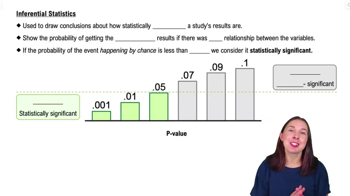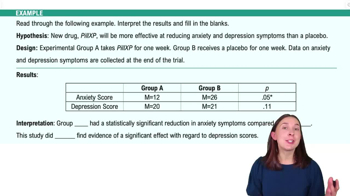Table of contents
- 1. Introduction to Psychology1h 43m
- 2. Psychology Research2h 20m
- 3. Biological Psychology2h 41m
- 4. Sensation and Perception28m
- 5. Consciousness and Sleep32m
- 6. Learning41m
- 7. Memory34m
- 8. Cognition37m
- 9. Emotion and Motivation35m
- 10. Developmental Psychology33m
- 11. Personality48m
- 12. Social Psychology41m
- 13. Stress and Health41m
- 14. Psychological Disorders44m
- 15. Treatment47m
2. Psychology Research
Evaluating Research Findings
Struggling with Psychology?
Join thousands of students who trust us to help them ace their exams!Watch the first videoMultiple Choice
The theory of human motivation that considers three inborn and universal needs—autonomy, competence, and relatedness—is called
A
the Yerkes-Dodson law.
B
expectancy-value theory.
C
self-determination theory.
D
arousal theory.
 Verified step by step guidance
Verified step by step guidance1
Identify the key components of the problem: the theory of human motivation and the three inborn and universal needs—autonomy, competence, and relatedness.
Understand the concept of 'self-determination theory' which posits that these three needs are essential for psychological growth and well-being.
Differentiate between the theories mentioned: Yerkes-Dodson law, expectancy-value theory, and arousal theory, noting that they do not focus on these three specific needs.
Recognize that the self-determination theory is unique in its emphasis on autonomy, competence, and relatedness as fundamental to motivation.
Conclude that the theory described in the problem is the self-determination theory, as it aligns with the specified needs.

 6:00m
6:00mWatch next
Master Descriptive Statistics – Measures of Central Tendency with a bite sized video explanation from Hannah Gordils
Start learningRelated Videos
Related Practice















![Ethical Guidelines in Psychology [AP Psychology Unit 1 Topic 6] (1.6)](https://img.youtube.com/vi/ilq2nGO7_QA/mqdefault.jpg)





























